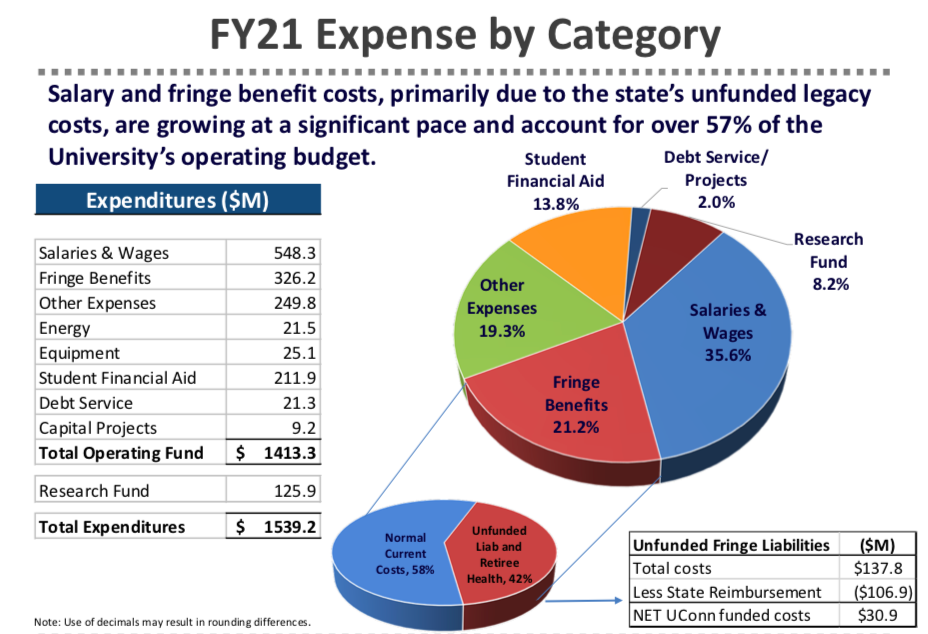The University of Connecticut is facing an estimated $50 million budget shortfall due to the COVID-19 pandemic and is having to furlough managers and cut its athletics department to make up for the deficit.
Although the school faced a loss after having to send students home midway through the spring semester, much of the budget shortfall comes from employee raises and unfunded pension costs.
During a budget report to the UConn Board of Trustees on Wednesday, Chief Financial Officer Scott Jordan said the university had budgeted for a 5.5 percent increase in labor costs in accordance with the 2017 SEBAC agreement, for a total cost of $20 million.
The university is also on the hook for $30.9 million in unfunded pension liability costs, due to Connecticut’s long-standing pension funding problems.
Salaries and fringe benefits for university employees makes up 57 percent of UConn’s total budget, totaling nearly $875 million in the upcoming fiscal year.

The $50 million budget deficit is the largest deficit in the state university’s history, according to the presentation.
The university has cancelled the raises for non-union management employees, who will also have to take furloughs of varying lengths during the summer.
The university is cutting $10 million from its Athletics Department and ending men’s cross-country, tennis, swimming & diving and women’s rowing as university-sponsored sports.
Jordan said that “just a deferral for a year,” of the raises would put the university in a better position, but the union representing UConn professors indicated it would not budge on any give-backs.
A spokesman for the UConn chapter of the American Association of University Professors offered comments at the beginning on the call, stating that his members had already given back enough in SEBAC negotiations in 2009, 2011 and 2017.
The trouble at UConn reflects the larger state-wide battle over state employee raises scheduled for July, as Connecticut faces massive budget gaps for the foreseeable future due to the pandemic and economic downturn.
Gov. Ned Lamont said he favored suspending some of the state employee raises but union leaders refused to negotiate. The governor said there was nothing he could do.
Also weighing on UConn’s budget is Connecticut’s unfunded pension liabilities, a continual source of deficit for both UConn and UConn Health.
According to the Board of Trustees presentation, UConn will pay $326.2 million in fringe benefit costs for employees, and $137.8 million of that cost is due to Connecticut’s unfunded pension debt.
The state of Connecticut reimburses UConn for $106.9 million in unfunded pension costs, leaving the university a payment of $30.9 million.
The UConn AAUP spokesman suggested the state should increase its payment toward the unfunded pension costs for UConn to help make up the difference.
However, the state is already set to grapple with a large budget shortfall next year ranging from $2 billion, according to state estimates, to upwards of $6.5 billion, according to researchers from Arizona State and Old Dominion universities.
Jordan says there is “significant uncertainty” about the budget projections because of the COVID-19 pandemic and questions about how much help the university might get from the federal government or the state.
A worst-case scenario placed UConn’s deficit at potentially $129 million.
One bright spot in UConn’s report was that enrollment deposits for domestic students were up 17 percent, unlike many other universities across the country, and philanthropic donations to the university have increased.
“During times of crisis, there is a rush to value,” Jordan said. “We’re very fortunate. It’s reflective of a UConn education.”


James Hagan
June 24, 2020 @ 9:26 pm
Like all CT unionized employees, they were able to negotiate routine and large raises, as well as job protections far superior and antithetical to anything in the private sector.
The result is an unsustainable overhead, that is crippling the CT taxpayers. Will the Democratic legislature do something about that? Absolutely not. The Democrats rely heavily on union financial support and union labor votes, so they will do nothing to jeopardize the union vote.
Instead, the Democrats will stand idly by, while the “USS CT” sinks under the weight of the labor costs and unfunded pensions.
May God have mercy on their souls. I have no idea how they sleep at night.
Anonymous
June 25, 2020 @ 4:09 pm
Connecticut state and many towns in CT are sinking ships. Politicians who can save can never get elected, as state and local employees and minorities make up more than voting majority. The net employment increase since 1983 AD is big zero in CT and state and local employee wages are that of 2100 AD. State currently has about 1 million employees working in private and non-profit sector and 250,000 people drawing wages from the state and towns and about 500,000 collecting unemployment. One million pvt sector employees who make about $45000 in median wages cannot support 250,000 state and local employees making $120 to 130K (in wages and pension benefits). Only Madoff can solve our problem and you know where he is….
JUSTIN KYLE TANNER
June 29, 2020 @ 11:53 am
Hi! Sate employee here! Do you know how much state taxes have outgrown state pay? That’s right, 3-1. I literally have paid for my raise 2 times over. How about y’all STFD and actually advocate for change and not against working families. Cheers.
Bill Breetz
July 1, 2020 @ 10:54 am
It was Winston Churchill who wrote “Never let a good crisis go to waste.” Connecticut surely has a ‘good’ – if by that that we mean ‘enormous’ – crisis; it is time we stop simply grousing about the State unions – as a moderate independent who has always voted for Democrats, I have personally done plenty of that – and begin to use the few available tools to solve the problems created when Dan Malloy and a remarkably cowed Democratic General Assembly agreed to a 10 year contract with the state unions that had no outs for ‘unforeseen circumstances’ such as Covid-19.
Long term, the onus is on the Republicans to recognize that the party of Donald Trump needs to offer voters reasonable alternatives for state offices – not just a series of millionaires who agree to self-fund their own campaigns and run on an irrational proposal to eliminate the state income tax! That’s the only way, long term, the union’s strangle hold can be loosened.
In the shorter term, The Governor could do two things:
First, toughen up, suck it up, and let the positions of all retiring state employees remain unfilled. It will start to hurt – but it will send an important signal to the unions: the Governor really means to fix the State’s finances one way or the other.
Second, use the power of reorganization to eliminate positions. Create a new Office of Technology – and assign specific tasks to it that use tecnnology to do what the used to be done by those eliminated positions. Start with the Department of Motor Vehicles, the Department of Revenue Services. Could drones and driveless cars replace state troopers patrolling our highways? The unions will surely sue to challenge the moves – that’s what we have the Attorney General for. Then perhaps the unions might also decide to have honest negotiations.
The twin threats of losing elections to more moderate Republicans and being hounded by an electorate that simply won’t stand for the consequences of union intransigence might cause my old party to rethink the best means they have of remaining in office – fixing the problem.
The state’s employees serve many vital services – so do the private sector employees who have